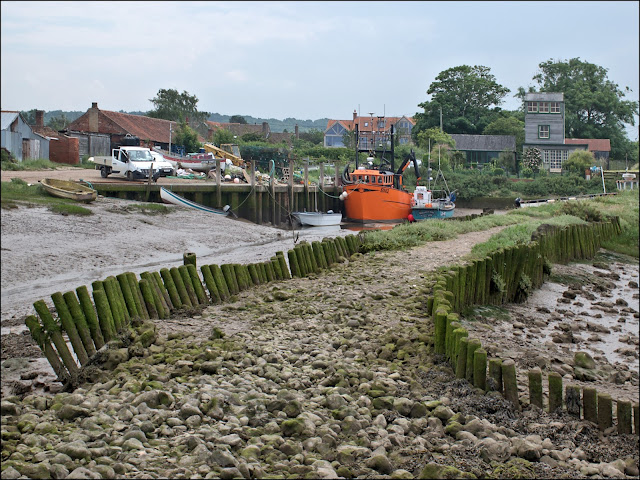As we were finishing our packed lunch, after our jaunt along the coast, Les suggested going to Brancaster Staithe. So we did.
"Staithe" is a word which occurs up and down the east coast of England and just means a wharf or dock, a place where ships can load and unload. Nowadays there are more leisure craft than hard-working little boats, and anyone pulling into Harbour Way to buy their crabs or shellfish will only see small sailing boats, floating at anchor at high water or resting on the mud when the tide is out.
But follow this old battered causeway and it'll lead you directly into Brancaster's past and into the heart of its industrial heritage. Back in the eighteenth century this was a much busier place and boasted one of the largest industrial buildings in the land, a huge malthouse capable of supplying the brewing industry with 120 tons of barley malt every week. But by the late nineteenth century much of the trade had moved elsewhere and the harbour was only used by a small fishing fleet, which is how things have remained.

















Small boats making a living from the sea are a thing of the past. They certainly didn’t contribute to global warming.
ReplyDeleteHi John - looks an ideal place for a good walk with your brother ... loving your take on it - and the coast in general ... while crab takes me back to Cornwall when my mother lived there. So much history to be found ... cheers Hilary
ReplyDeleteLike the dog standing in the queue in that last photograph - I wonder what is going through his mind. Super images of the past - I wonder what my first husband, a painter, would have made of all those old broken boats - he loved painting that sort of thing.
ReplyDeleteI wonder about the people that owned those boats and fishing equipment. Did they just walk away from that life? Go out of business and leave it behind? What happened to them - did they move away from there?
ReplyDeleteSome of them are still in business, others found jobs in the growing tourist industry in N Norfolk, including taking people over to Blakeney Point to see the seal colony. Abandoned equipment was the norm in many industries - farms, mines and railways were always surrounded by old machinery. Nowadays it's all tidied up or hidden away and most of the wrecking of the environment takes place invisibly through chemical pollution in rivers and carbon released into the atmosphere.
DeleteSuch an interesting place for a walk with your brother. Like a step back in time.
ReplyDeleteA bit sad to see that a way of life has so drastically changed. What is with that bow of a boat sticking up? Is it just half a boat or is the rest buried in the sand? Around here I see the trucks just sitting in the weeds or the farm equipment long since rusted and wonder why?
ReplyDeleteThe way of life here has been changing for centuries as old harbours have naturally silted up and channels become navigable only to the smallest boats. The rest of that boat is sitting in deep mud and I didn't go to investigate!
DeleteVery interesting photos! I do hope those folks are going to share their crab lunch with that doggie. Enjoy your day, hugs, Edna B.
ReplyDeleteIt looks like an end of an era!
ReplyDeleteThank you for this wander through the past.
ReplyDeleteça fait du bien de voir ces images du bord de mer avec ces traces d'un passé pas si lointain. on a l'impression de respirer l'air marin même si c'est dommage de laisser à l'abandon des casiers, etc qui pourraient peut-être servir encore.
ReplyDeleteWhat a wonderful series of photos, John. I really enjoyed seeing those old boats, what a story they could tell. Thanks for sharing these beauties!
ReplyDeleteGreat piece of history a walk around the old harbour. Love seeing those rotting boats
ReplyDeleteWhat a lovely inland harbour, you only really find those in South Lincs and East Anglia!
ReplyDeleteThat's quite the tide, and interesting history too.
ReplyDeleteI'm still sad that Covid prevented my planned holiday here last year. It looks so photogenic.
ReplyDeleteI can vouch for the Prawn sandwiches from the Crab Hut, they are delicious!
ReplyDeleteA great set of images of a special place along the North Norfolk coast!
How is it possible that those sad old remains of hard working boats can be so incredibly photogenic John, gorgeous series, I enjoyed very much ✨
ReplyDeleteSo many of those old pictures remind one that nature will take back its own. The whole area is charming and worthy of your visit.
ReplyDeleteThis is very nostalgic, so photogenic but with an element of sadness too, but times move on.
ReplyDeleteLast week I was on Cape Cod, the southeastern part of Massachusetts, where your countrymen first touched down in 1620. There are still quite a few people who make their livings from the sea. Some of your photos today could have been taken on the Cape. Of course, there are also many pleasure craft and boats carrying tourists, like the one that took my family and me to watch whales.
ReplyDeleteBeached boats, fish and crab traps. I could smell the seashore.
ReplyDelete